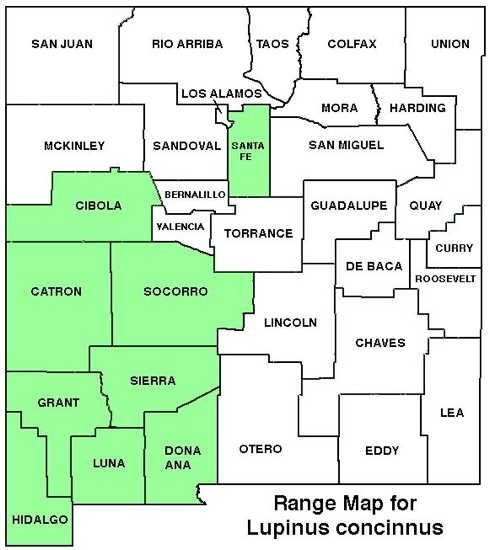WILDFLOWERS OF NEW MEXICO

The basal rosette germinates in the winter for spring blooming; stems single or branching from the base, reaching 2–12-inches tall. A spike-like flower cluster has a few scattered, purple and white blooms. Note the leaves are densely covered on both sides with long, woolly, spreading hairs.
FLOWER: March–May. The flowering stem is usually shorter than the leaves. Flowers bilaterally symmetrical, petals lilac to whitish, edged with reddish-purple; upper banner petal purple with a central white spot, 2 side wing petals have purple edges, and the keel has 2 united, purple-tipped petals; calyx beneath the petals densely, woolly hairy. Fruit a hairy, oblong, straight pod 3/8–5/8-inch long (10–15 mm) containing 2–4 seeds.
LEAVES: Basal, crowded; alternate on stem. Blades palmately compound with a 1 5/8–3 1/8-inch long (4–8 cm), hairy petiole; 5–8 leaflets, 3/8–3/4-inch long (1–2 cm), tips rounded; both surfaces and margins densely covered with long hairs.
HABITAT: Rocky, sandy, clay, loamy soils, open woodlands, fields, roadsides; desert grasslands and scrub, pinyon-juniper, ponderosa pine-Gamble oak woodlands.
ELEVATION: 4,400–6,900 feet.
RANGE: AZ, CA, NM, NV, TX, UT.
SIMILAR SPECIES: King’s Lupine, L. kingii, in the western half of NM, is also hairy but has spreading stems and pods with only one seed.
NM COUNTIES: Southern NM in low-elevation, arid habitats: Catron, Cibola, Dona Ana, Grant, Hidalgo, Luna, Sierra, Socorro, Santa Fe.

BAJADA LUPINE
LUPINUS CONCINNUS
Legume Family, Fabaceae
Annual herb


THE CONTENTS OF THIS WEBSITE ARE COPYRIGHTED AND CANNOT BE USED
WITHOUT PERMISSION OF GEORGE OXFORD MILLER


EMAIL ME